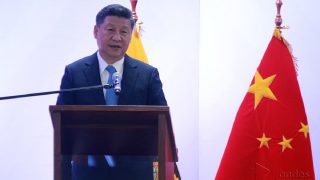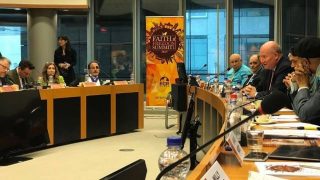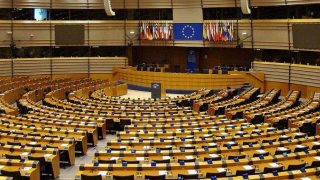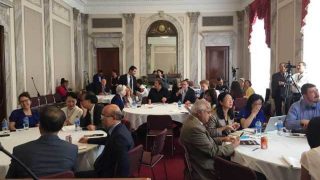China has the largest section in the annual report, denouncing repression of all faiths and torture against Uyghurs, Falun Gong practitioners, members of The Church of Almighty God, and others. The most quoted media? Bitter Winter
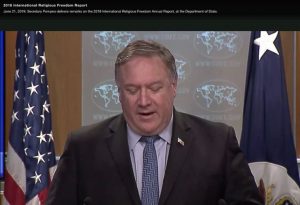
Massimo Introvigne
China, the Worst Country for Believers
On June 21, Secretary of State Mike Pompeo and U.S. Ambassador-at-large for International Religious Freedom, Sam Brownback, unveiled the yearly Report on International Religious Freedom of the U.S. State Department for 2019, covering the year 2018. Secretary Pompeo singled out China, together with Iran, as the worst place in the world for those belonging to a minority religion, “treating religious minorities as national security threats meriting surveillance, imprisonment and sometimes death.”
While Iran mistreats those who are not Muslims, China persecutes all religions. Only the five authorized religions, the report explains, are “officially authorized to hold worship services,” but not without limitations. In fact, as the section on China, the largest and most detailed of the whole report explains, in 2018 “there continued to be reports of deaths in custody and that the government tortured, physically abused, arrested, detained, sentenced to prison, or harassed adherents of both registered and unregistered religious groups for activities related to their religious beliefs and practices.” In China, “individuals who participate in unsanctioned religious activities are subject to criminal and administrative penalties.’
In 2018, the document notes, there were several “reports that authorities subjected individuals to death, forced disappearances, and organ harvesting in prison because of their religious beliefs or affiliation.” The evidence of organ harvesting, the report says, is overwhelming, and attempts by the CCP to deny that the horrific practice is still going on are just propaganda.
Methodology of the Report: Bitter Winter, a Trusted Source
The report, in the tradition of the State Department documents, adopts the methodological approach of attributing each piece of information to the source that reported it. Statements are not assertive (e.g. “The police tortured twenty Christians”) but attributive (e.g. “The New York Times reported that the police tortured twenty Christians”). Once this methodological choice is understood, reading the report becomes easier. And clearly, as it claims, the report only quotes from sources the State Department double-checked and regards as reliable.
The report also quotes from trusted NGOs and their Web sites. About China, ChinaAid is the most quoted one, with twenty quotes.
It is a source of great pride for this magazine that among news media and daily and weekly newspapers, Bitter Winter is the most quoted publication in the report. It is mentioned 15 times. A distant second, The New York Times is quoted 7 times. This is a fantastic result for Bitter Winter, which was only launched in May 2018, and is certainly due to the commitment (and sacrifice, since many have been arrested) of our brave reporters in China.
Uyghurs and Other Muslims
A good part of the report discusses the persecution of Uyghurs, ethnic Kazakhs, and other Muslims in Xinjiang. The document also notes that the repression is extending to Hui Muslims outside Xinjiang.
“Multiple media and NGOs, the report says, estimated that since April 2017, the government detained at least 800,000 and up to possibly more than 2 million Uighurs, ethnic Kazakhs, and members of other Muslim groups, mostly Chinese citizens, in specially built or converted detention facilities in Xinjiang and subjected them to forced disappearance, torture, physical abuse, and prolonged detention without trial because of their religion and ethnicity.” The estimate of two million refers to 2018, while by mid-2019 other sources claim the number has reached three million.
“There were reports of deaths among detainees, the report says. Authorities maintained extensive and invasive security and surveillance, particularly in Xinjiang, in part to gain information regarding individuals’ religious adherence and practices.” “Authorities in Xinjiang punished schoolchildren, university students, and their family members for praying. They barred youths from participating in religious activities, including fasting during Ramadan. The government sought the forcible repatriation of Uighur Muslims from foreign countries and detained some of those who returned.”
Among the incidents reported, the document mentions that “more than 10 Uighur women committed suicide during the year in direct response to pressure or abuses by authorities. Reportedly, officials came to their homes and said either the women had to marry a Han Chinese man or the officials would take their parents into detention. To prevent this, the women committed suicide.”
The report also states that,”NGOs and international media reported arrests and detentions of Muslims in Xinjiang for ‘untrustworthy behavior’ such as attending religious education courses, possessing books about religion and Uighur culture, wearing clothing with Islamic symbols, and traveling to certain counties.” And the CCP, the report says, is “holding children in orphanages after their parents were taken to internment camps.”
Even outside the camps, life is grim in Xinjiang, where “the government issued guidelines warning officials to look out for 75 ‘signs’ or behaviors that signified religious extremism. These guidelines included growing a beard, praying in public outside of mosques, and abstaining from smoking or drinking alcohol.” The report also mentions that “authorities had dispatched more than one million Communist officials from other parts of the country to live with local families in Xinjiang. … Authorities also subjected families to political education from the live-in officials .” Slowly, the report claims, the whole region is being converted to an open-air jail.
Christian House Churches
The report clarifies that even the CCP-controlled Three Self Church, suffers limitations. However, it shares the opinion of legal scholars that the main aim of the New Regulation on Religious Affairs, which came into force on February 1, 2018, is to destroy independent house churches and compel them to join the Three Self Church.
“Christian church leaders, the report says, stated the government increased monitoring even before the new regulations came into effect, causing many churches to cease their normal activities. Authorities continued to arrest Christians and enforce more limitations on their activities, including requiring Christian churches to install surveillance cameras to enable daily police monitoring, and compelling members of house churches and other Christians to sign documents renouncing their Christian faith and church membership. An ongoing campaign of church closings continued during the year, and authorities removed crosses and other Christian symbols from churches, with Henan Province a particular focus area of such activity.”
The report mentions the well-known persecution of the Early Rain Covenant Church in Chengdu and the destruction of the Golden Lampstand Church, a part of the Sola Fide network, in Linfen. It also states that “at least four cities and one province ordered restrictions on Christmas celebrations including bans on Christmas decorations, promotional activities in shops, Christmas-themed events, and public performances. Authorities also increased law enforcement and patrols in the days leading up to December 25 to prevent any illegal Christmas celebrations. Police in Kunming issued a notice prohibiting Christmas decorations and related activities in crowded places such as hotels, karaoke parlors, internet cafes, and bars. The notice said, ‘It is forbidden to hang Christmas stockings, wear Christmas hats, and place Christmas trees, and so on.’”
Catholics
As other U.S. documents, the report remains unpersuaded about the benefits of the Vatican-China deal of 2018 and mentions criticism by retired Cardinal Joseph Zen of Hong Kong. “At year’s end, the report notes, there was no official explanation on what the mechanism would be for the Vatican and the government to make decisions regarding appointment of bishops.”
The report states that Catholics who criticize the CCP continue to be arrested and their churches closed down and demolished. Catholics are forced to join the CCP-controlled Patriotic Catholic Church, even if the Vatican insists that this should not be regarded as mandatory under the agreement.
Xie Jiao
The report notes that in China, “law bans certain religious or spiritual groups. The criminal law defines banned groups as ‘cult organizations’ and provides for criminal prosecution of individuals belonging to such groups and punishment of up to life in prison. There are no published criteria for determining, or procedures for challenging, such a designation. A national security law explicitly bans ‘cult organizations.’ The CCP maintains an extralegal, party-run security apparatus to eliminate the Falun Gong movement and other such organizations. The government continues to ban Falun Gong, the Guanyin Method religious group (Guanyin Famen or the Way of the Goddess of Mercy), and Zhong Gong (a qigong exercise discipline).” Being Christian is no protection against such labeling. “The government also considers several Christian groups to be ‘evil cults,’ including the Shouters, The Church of Almighty God (also known as Eastern Lightning), Society of Disciples (Mentu Hui), Full Scope Church (Quan Fanwei Jiaohui), Spirit Sect, New Testament Church, Three Grades of Servants (San Ban Puren), Association of Disciples, Lord God religious group, Established King Church, the Family Federation for World Peace and Unification (Unification Church), Family of Love, and South China Church.” The report translates xie jiao as “evil cults.” This is the translation used by CCP itself in its English-language documents, although most scholars maintain that “heterodox teachings” would be more accurate.
The report also mentions that a powerful apparatus of anticult propaganda and fake news is at work in China against the groups designated as xie jiao. For example, “on March 17, Guangzhou’s Huadu District Political and Law Commission hosted an anticult organization event in Hongshan Village for local students. After the event, many students vowed to stay away from any ‘cult’ organization and signed their names on the anticult signature wall.” Similarly, “in April Fujian Province’s Zhangpu County Government and Zhangzhou Justice Department redesigned a local public park giving it an anticult theme to promote the results of the 19th Party Congress and related anticult laws and raise awareness of the influence of ‘cults.’’
The Church of Almighty God
As a religion, Islam accounts by far for the largest group of detained believers in China. As a single religious movement, The Church of Almighty God emerges from the report as the most persecuted group. “The Church of Almighty God, the report states, reported authorities arrested 11,111 of its members during the year,” against 9,000 from Falun Gong, the second most targeted group. “The Church of Almighty God, the document adds, reported authorities subjected hundreds of their members to ‘torture or forced indoctrination.’”
Several individual cases are reported. “A member of [T]he Church [of the Almighty God] died while in custody shortly after Guizhou authorities arrested her on an unspecified charge in March. Authorities said the unnamed person committed suicide by hanging herself, but did not allow her family to view her body. Officials reportedly told her family the government did not approve of her Christian beliefs. When her relatives questioned the government’s determination of her death as suicide, authorities threatened them with potential loss of employment and university access for their children.”
In a separate incident, “The Church of Almighty God reported that in April CCP police secretly arrested and tortured one of its members for 25 days. The individual was sent to the hospital with severe injuries to the skull and she died several months later. The Church of Almighty God also reported that on June 27, two church members were arrested, and on July 2, one of them was ‘persecuted to death’ in Chaoyang Municipal Detention Center.”
And “in August the Association for the Defense of Human Rights and Religious Freedom (ADHRRF), an international NGO providing regular reports on the situation of the Church of Almighty God, reported that between April and August, authorities in Chongqing, Sichuan Province, detained 109 church members. Of those, 40 remained missing at year’s end.”
Overall, “The Church of Almighty God reported authorities subjected 525 of its members to ‘torture or forced indoctrination’ during the year. The Church also reported members suffered miscarriages after police subjected them to ‘torture and abuse’ in detention facilities.”
Falun Gong
Although Falun Gong is compelled to operate underground, the report insists it is still very much present in China, and persecution continues. Several examples are supplied.
One is Ye Guohua, a Falun Gong practitioner who was arrested and taken “to the Jianye Detention Center where his family believes he was brutally tortured for his Falun Gong practice. On September 8 [2018], Ye suffered what authorities said was a sudden acute illness and was sent to the hospital. Authorities allowed his family to see him briefly, and family members reported Ye was in a coma and his body was swollen. He died three days later. A local Falun Gong practitioner called the detention center to inquire about what happened to Ye and the person who answered the phone said, ‘He’s dead, so there’s nothing that can be done. Asking about this is just asking for trouble.’”
The Canadian newspaper Globe and Mail, quoted by the document, “reported in September that authorities tortured a Canadian citizen who is a Falun Gong practitioner during her 18-month pretrial detention in Beijing. While detained, authorities reportedly initially deprived the individual of food and water, and later pushed her to the ground and pepper sprayed her. Officials arrested her in February 2017 on charges of ‘organizing or using a cult to undermine implementation of the law.’ After the arrest, her husband, whom she stated she believed turned her in to authorities, reportedly transferred all of her property and company shares to his name.”
Tibetans and other Buddhists, Taoists
The report quotes Bitter Winter about the widespread destruction of Buddhist and Taoist statues and temples. It also mentions the CCP’s bizarre claim that it should control the reincarnation of lamas in Tibet. In fact the report says, “depending on the perceived geographic area of influence of the lama, relevant administrative entities may deny permission for a lama to be recognized as reincarnated and these entities must approve reincarnations. The State Council has the right to deny the recognition of reincarnations of high lamas of ‘especially great influence.’ The regulations also state no foreign organization or individual may interfere in the selection of reincarnate lamas, and all reincarnate lamas must be reborn within China. The government maintains a registry of officially recognized reincarnate lamas.”
In general, the situation is getting worse in Tibet. The CCP forces “Tibetan monks and nuns to undergo political training in state ideology. The policy requires monks and nuns to demonstrate – in addition to competence in religious studies – ‘political reliability,’ ‘moral integrity capable of impressing the public,’ and willingness to ‘play an active role at critical moments,’” which in Communist jargon means supporting the CCP.
The report highlights that, “since 2009 more than 150 Tibetans had set themselves on fire in protest against what they said was occupation and human rights abuses on Tibet’s religion and culture under Chinese rule. According to media reports, 16-year-old Gendun Gyatso self- immolated in Ngaba (Chinese: Aba) County, Tibetan Autonomous Prefecture (TAP) in Sichuan Province, on December 8 or 9 and died of his injuries. Media said that on December 8, Drugkho (reportedly also known by his monastic name Choekyi Gyatso), a young Tibetan man, set himself on fire in Ngaba shouting, “long live the Dalai Lama.” Some news reports stated he may have survived. Reportedly, both Gendun and Drugkho were monks at Kirti Monastery. According to the website Tibet Sun, on November 4 in Ngaba, Dopo, another Tibetan youth, died after carrying out a self-immolation, reportedly shouting ‘Long live the Dalai Lama.’ On March 7, Tsekho Tugchak (also spelled ‘Topchag’), a man in his forties, reportedly called out, ‘Long live His Holiness the Dalai Lama and freedom for Tibet’ as he self-immolated in Meruma Township, Ngaba County; the location of his remains was unknown. Ngaba County had also been the site of numerous prior self-immolations by monks from the Kirti Monastery.”
There were many “reports of the forced disappearance, torture, arbitrary arrest, and physical abuse of individuals on account of their religious beliefs or practices” in Tibet. The report mentions a “Tibetan monk’s account of torture and sexual abuse in a re-education camp in the TAR [Tibet Autonomous Region]. The monk said, ‘Many nuns would lose consciousness during the [military] drills. Sometimes officers would take unconscious nuns inside where I saw them fondle the nuns’ breasts and grope all over their body.’ He also stated some inmates ‘were singled out and beaten up so severely with electric batons that they would lose consciousness. The officers would revive the unconscious inmates by splashing water on their faces. This cycle of losing and reviving consciousness would go on for some time at the end of which the officers would use a black plastic pipe to beat and pour water on all parts of the body and then use electric batons to beat some more. Soon black and blue marks would appear on the victim’s body and render him or her half-dead.’”
Refugees: South Korea
Sections of the report on other countries are of interest for China as they mention a deteriorating situation for asylum seekers and general hostility against refugees, including those fleeing religious persecution. This general problem is mentioned about South Korea. It is, however, unfortunate that as an example the report only mentions refugees from Yemen, while Chinese refugees from Falun Gong and The Church of Almighty God are also in a precarious situation there.
Interestingly, the report mentions that some mainline Christians in South Korea persecute members of Christian groups they regard as “heretic,” and may even kidnap and beat them. “In January, the document says, following reports that parents killed their daughter while attempting to force her to convert from what the parents viewed as a cult to their own Christian denomination, 120,000 citizens gathered in Seoul and elsewhere to protest against coercive conversion, reportedly conducted by some Christian pastors. The protestors criticized the government and churches for remaining silent on the issue and demanded action.”
Although not mentioned in the report, the same Christian “heresy hunters” also actively support the CCP persecution of Falun Gong and The Church of Almighty God and harass their refugees in South Korea.
source:BITTER WINTER/Massimo Introvigne
